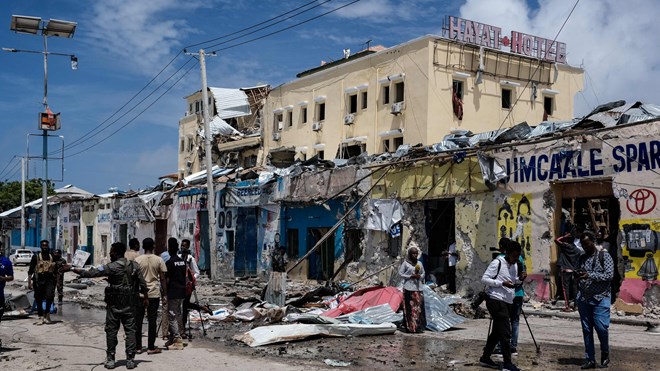
Harun Maruf
Tuesday August 23, 2022

Officials said that 117 others had been wounded in the 30-hour siege by Shabab militants at an upscale hotel in Somalia’s capital.CreditCredit...Hassan Ali Elmi/Agence France-Presse — Getty Images
Somalia’s prime minister is promising accountability after the latest al-Shabab attack, on a popular Mogadishu hotel, killed 21 people and injured 117 others.
Hamza Abdi Barre said the government takes responsibility for what happened in Friday’s attack on the Hayat Hotel.
After visiting hospitals treating the injured victims, Barre said those who failed to “perform their duties, anyone who fell short, and anyone who infringed will be held accountable.” He added, “A repeat of what has happened is not acceptable.” The comments aired late Sunday on state television.
He did not single out any person or government branch for specific blame.
Mukhtar Robow, the former deputy leader of al-Shabab, now the country’s religious affairs minister, condemned the attack as well in a televised speech, along with religious clerics.
“This is not right and you know it,” Robow said in remarks aimed at al-Shabab. “Give up and repent.”
Robow, also known as Abu Mansour, called for unity against the Islamist militant group.
Government troops ended al-Shabab's siege on the hotel after a 30-hour operation.Al-Shabab has been carrying out raids on hotels, government ministries and installations since 2010. While this attack is not unique, observers believe the group was responding to recent rhetoric from new Somali President Hassan Sheikh Mohamud, who said he has come up with a new strategy to weaken the group before opening the door for possible negotiations.
The government and its allies will wage military, ideological and economic war against the group, the president said.
Al-Shabab is attempting to counter the government’s pronouncements, said Samira Gaid, executive director of the Hiraal Institute, a Mogadishu-based research institution.
“It was also a message to the administration and the public as well that they cannot be simply eradicated,” she said.
Al-Shabab spokesman Abdiaziz Abu Mus'ab did state the group was responding to the president.
The attackers
A senior Somali government security official who requested anonymity because he does not have authorization to speak to the media told VOA Somali that security branches believe al-Shabab surveilled the hotel before the attack. He said security officials believe the attackers watched video of the entrances and the hotel's rooms.
The official said seven militants were directly involved in the attack. Three of them were suicide bombers. The first one blew himself up at the gate at about 7:00 p.m. local time on Friday, followed by a car bomb explosion by another suicide bomber.
A third bomber detonated his suicide vest after security forces led by Muhiyadin Warba, the chief of the Mogadishu branch of the national intelligence and security agency (NISA), reached the hotel.
“The [third] bomber impersonated a guest who needed to be rescued and he detonated himself among the security forces, injuring nine,” the official said. One of the nine was Warba, who is now recovering.
Officials said they are investigating whether other people inside the hotel aided al-Shabab. Officials are not ruling out the possibility that some individuals who assisted in the attack hid among those rescued and escaped.
The hotel owner, Abdulkadir Moahmud Nur, denied that any of the hotel’s guests was involved, and rejected a social media rumor that some of the attackers had come to the hotel impersonating honey sellers.
“When the person comes to the hotel we record their passport, documents and the information of the person that brought them,” Nur told VOA Somali. ‘We do not accommodate someone without documents.
“I have seen people suggest the honey seller’s story - that is baseless,” he added.
Operation delays
Nur said it took the security forces nearly an hour to reach the hotel to engage the assailants.
Survivors confirmed to VOA that the third suicide explosion inside the hotel further delayed the response from the security forces.
“The rescue forces came late,” said Mohamed Hassan Haad, a traditional elder who said he was rescued after more than four hours hiding in an alleyway.
He said government troops entered from the main gate and fired heavy weapons but turned back after militants hurled grenades from the upper floors and after one of the attackers blew himself up.
“That paused the operation for a while. Four plus hours later they reached where I was hiding,” he said.
Security officials also said the main obstacle they faced came when the militants destroyed the hotel’s staircase.
Officials believe the militants blew up the stairs to prevent security forces from climbing to upper floors. The destruction of the staircase jeopardized the operation and prevented the security forces from directly engaging the militants. The troops were forced to use a crane to move their personnel to the upper floor.
Officials tell VOA Somali a lack of coordination among the different security branches meant the security operation lasted a long time.
They say the regular Mogadishu police and special police unit trained by Turkey, known as Haramcad (Cheetah), initially shouldered the responsibility for the operation. After two hours, the operation was taken over by Gaashaan (Shield) a counterterrorism unit that works under NISA and is supported by the United States. Then Haramcad completed the operation.
“In my experience, these changes sometimes stall the operation and allow the terrorists some respite,” said Gaid, who was the security adviser to former Prime Minister Hassan Ali Khaire.
VOA Somali attempted to contact security officials, but they did not respond to repeated phone calls.
(Hassan Kafi Qoyste contributed to this report.)